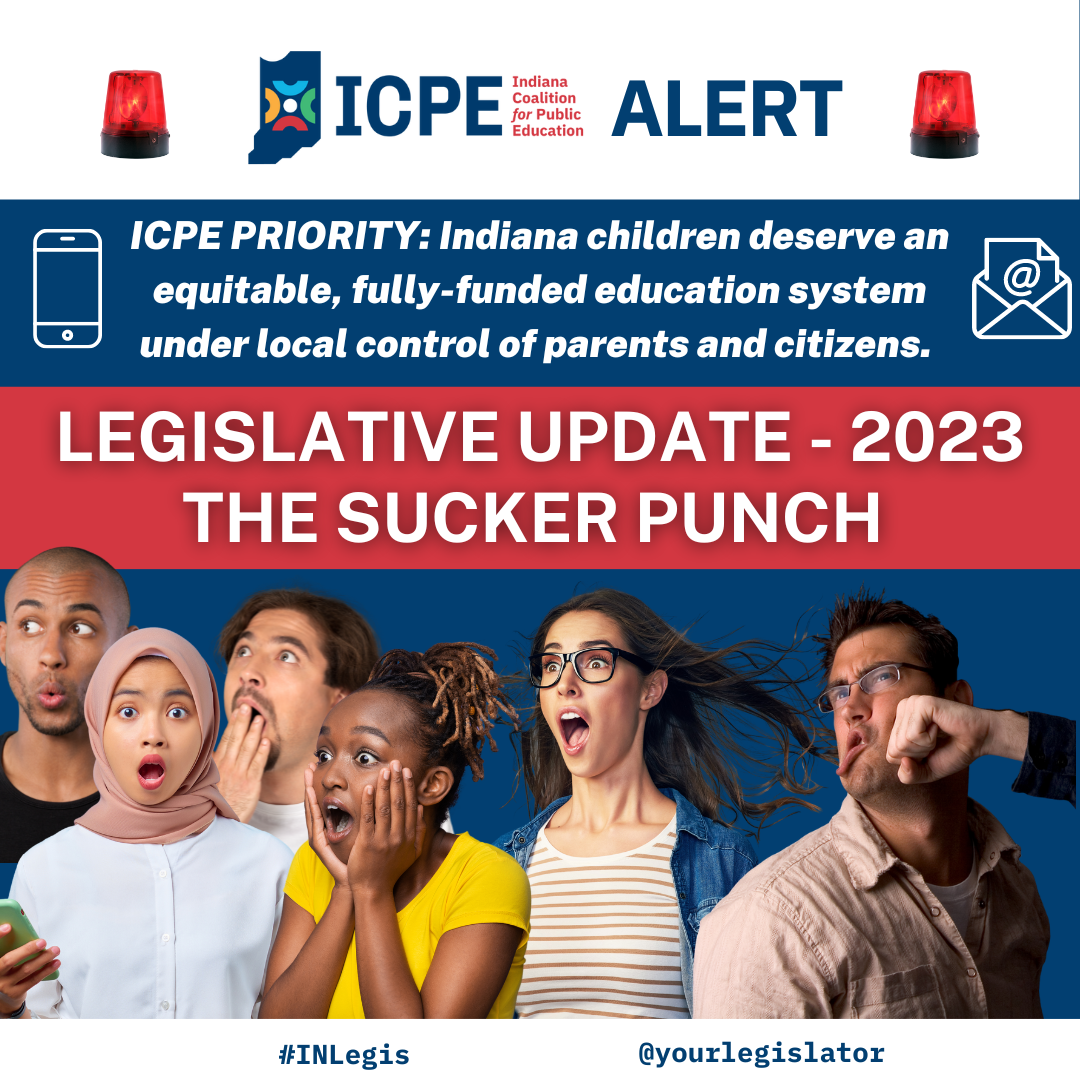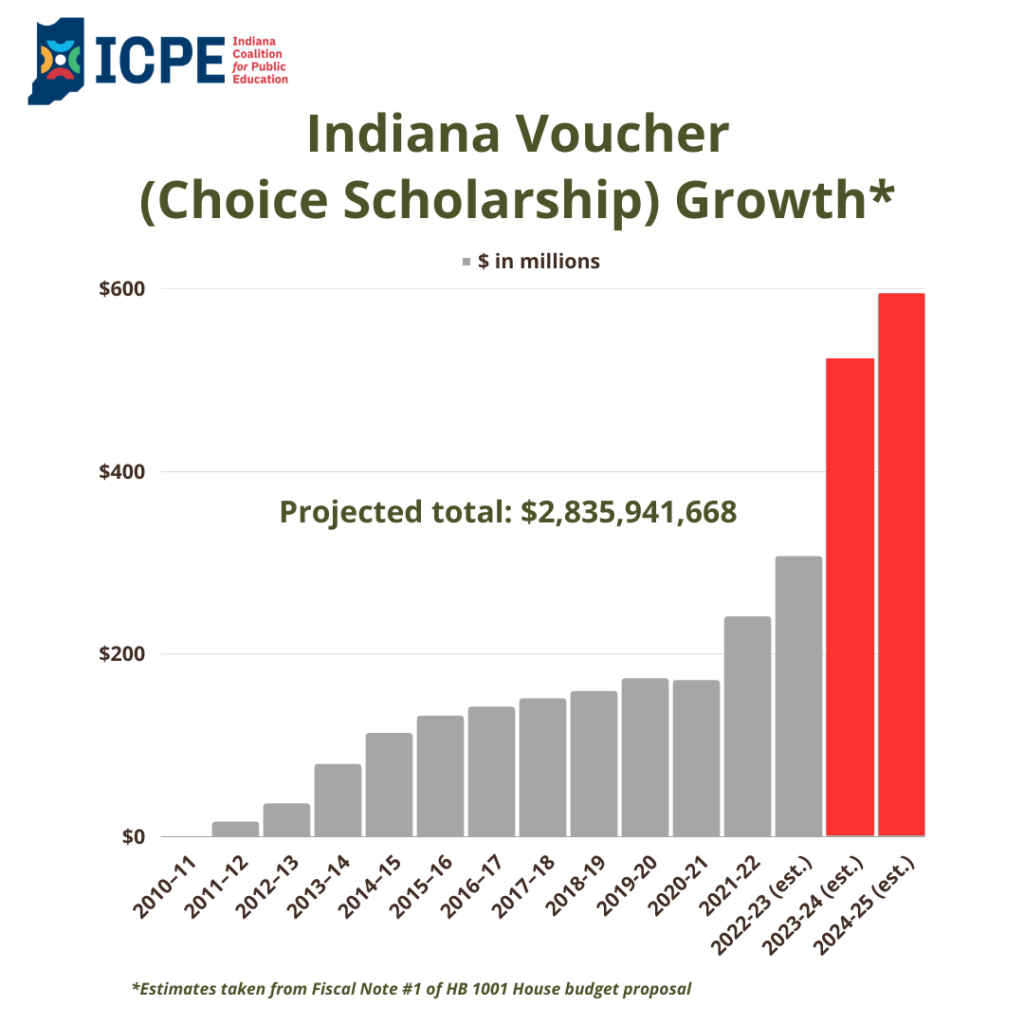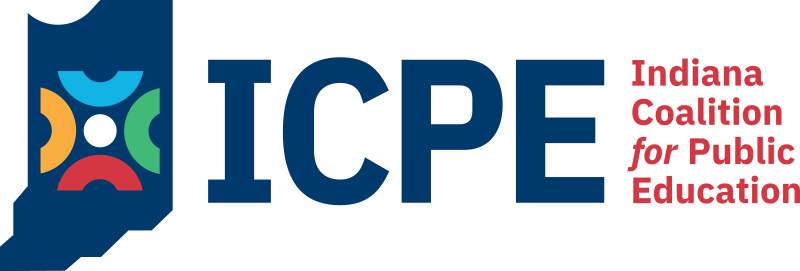Suckerpunched! A horrible day for Indiana K-12 public education with losses across the board

NOW IS THE FINAL TIME TO CALL ALL INDIANA LEGISLATORS:
Senators: (800) 382-9467
House Democrats: (800) 382-9842
House Republicans(800) 382-9841
As we always say, a budget reflects your priorities. For those who believed that the Senate was signaling some kind of compromise with extremists in the house, this budget is a suckerpunch. For those of us who have been in this fight for more than a decade, it comes as no surprise that the supermajority would steamroll over our teachers, our public schools and, most importantly, our kids, with their radical and extremist agenda.
While the budget (HB 1001) has not yet been voted on, yesterday we had a preview in the PowerPoint presentation from the legislature released at 1pm. The full text of the conference committee report became public at 5:00 (4/26/23). You should be able to find it on both the House and Senate Republican Caucus websites.
HB 1001 highlights about how the proposed budget bill will affect schools:
- Basic tuition support is $6,442 for Fiscal Year 23-24 and $6,517 for Fiscal year 24-25. The fall count date changes to October 1.
- The Charter schools grant goes up to $1,400 per pupil.
- The proposed budget includes $160 million for curriculum materials reimbursement, however that amount is divided up among public, charter and private schools.
- The budget bill limits charter schools to only a share of operations fund levies, and does not include school safety levies.
- HB 1001 prohibits paying teachers and principals out of the transportation fund.
Charter Schools
Some items in the Concurrence Committee Report for House Bill 1001 will increase financial accountability for Charter schools:
Charter schools that accept referendum funds must:
- Establish an operations fund and an education fund and follow the same provisions as a public school for those funds. They cannot transfer more than 15% from the educational fund to the operational fund without providing justifications.
- Adopt an annual budget following a public meeting. Charter schools that accept referendum funds must adopt a budget before November 1 and submit it to their charter authorizer AND the Department of Local Government Finance to be posted on its computer gateway.
Charter schools that want to use operations funds to pay for capital expenses must approve the plan at a public hearing, post the plan on their website at least 10 days before the hearing, submit a plan approved by their charter board to the Department of Local Government Finance (DLGF) within 30 days,
Education Scholarship Accounts (ESAs)
- Allocations for the existing ESA program for students with special needs remain flat at $10 million per year.
- Any unused money left in the ESA fund will revert to the State General Fund.
- The proposed budget bill creates a new ESA Donation Fund administered by the State Treasurer for investment and does not revert to the State General Fund.
Career Scholarship Accounts (CSAs): a new form of privatization
- The new Career Scholarship Accounts (CSAs) will be administered by the State Treasurer’s Office and will be capped at $5 million in the first year of the budget and $10 million in the second budget year. CSAs will be available to 10th, 11th and 12th graders who wish to enter into a work training program with an employer. The employer receives the CSA funds rather than the school.
- If a student chooses a CSA, the public school will not be eligible for Career and Technical Education funding.
- Students who start down the CSA track and change their minds after a few days/weeks or months could be locked out of CTE programs at school.
Vouchers

- Voucher eligibility will increase to the equivalent of 400% of free and reduced lunch – meaning all families of 4 making up to $220,000 will be eligible for this form of government assistance. We note this is equal to 742% of the current Federal Poverty Level. This change would amount to $498 million in the first year of the biennium. Incredible sums of taxpayer money will be draining out of the funding bucket intended for Indiana’s public school children.
- The 4/15 revenue forecast said Indiana would have an extra $1.1 billion to spend in FY24 & FY25. We note that half of that will go to extend the voucher program to affluent people who may already send their kids to private school.
- The previous pathways to qualify for a voucher will be eliminated. The only remaining pathway to qualify for a voucher will be income qualification.
- The age of eligibility for a voucher (currently five years of age) will be changed to four years of age, opening up vouchers to PRIVATE pre-K programs for wealthy families, yet they are choosing to not fully pay for public pre-K for all.
Despite Senator Mishler’s leadership this session in voicing his concerns about the accountability of voucher schools, despite the Senate’s version of the budget which included NO new money for vouchers, the power of the House Speaker Todd Huston and Representative Bob Behning won the day. They are working in tandem and are the primary drivers of this massive expansion. This is a government subsidized entitlement program for the wealthy. Our children and communities will be hurt as a result.
Textbook & Curricular Fees
The ONLY success the Senate had as it relates to K-12 in the budget is the separate line item for textbook/curricular fees. Consequently, it won’t have to come out of tuition support. However, we note that $160 million still wasn’t going to be enough to cover all textbooks and curricular costs in public schools. Under the final version of the Budget, that $160M must be shared with charter and private schools, so any difference will have to be made up out of what gets paid to teachers.
Final Thoughts
At the beginning of this session, we were bombarded and distracted by unnecessary bills in search of perceived problems, for which there are already-established processes. All along, they were clearly planning to expand “choice” by creating near-universal vouchers and bolstering charter school funding.
These proposals are not just about ideology. They are about money. We will do our best to demonstrate where this money came from and how it’s connected to your state legislature in the near future. The attack on public education does not happen in a vacuum and we need to peel away the layers to show you the deeper and broader context.
We expect the budget will be voted on this afternoon (4/27/23) or early evening and the legislature will likely adjourn sine die today.
This is a horrible day for Indiana K-12 public education. Losses across the board.
